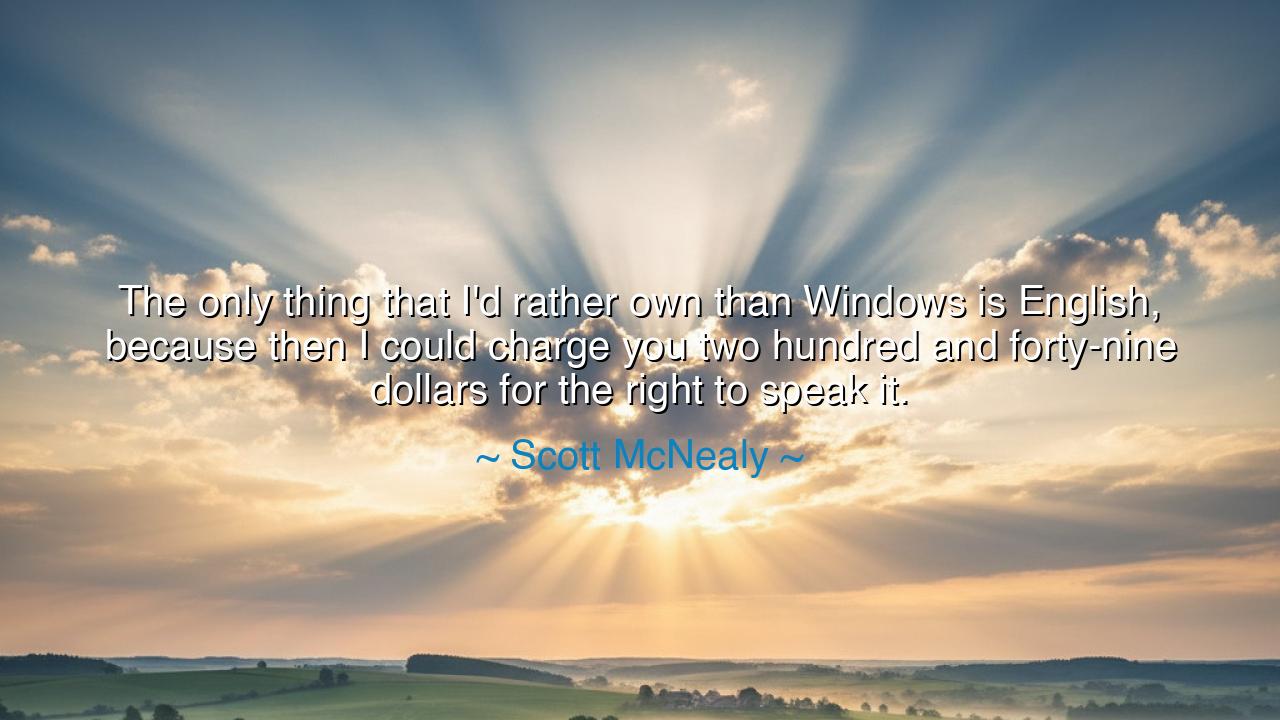
The only thing that I'd rather own than Windows is English
The only thing that I'd rather own than Windows is English, because then I could charge you two hundred and forty-nine dollars for the right to speak it.






Hear the biting wit of Scott McNealy, co-founder of Sun Microsystems, who once declared: “The only thing that I’d rather own than Windows is English, because then I could charge you two hundred and forty-nine dollars for the right to speak it.” His words, spoken in jest yet weighted with truth, reveal the power of monopoly, the strange dominion of ownership, and the dangers that arise when something essential is controlled by the hands of the few.
For what is Windows but the gateway through which millions once entered the digital world? To own it was to hold sway over a kingdom of minds, to set the price of participation in the new age of computing. McNealy saw in this dominance a sharp irony: that a single company could dictate the cost of entry into an invention that was rapidly becoming as necessary as food, water, or shelter in the modern world. By comparing it to English, he pointed to the absurdity of charging for something so fundamental to human life.
The analogy strikes deep. English, like all languages, is not owned by any one man or company. It is the living inheritance of generations, shaped by poets, peasants, scholars, and kings. It belongs to all who speak it, and its power lies in its freedom to be shared. Imagine, McNealy suggests, if it were otherwise—if every word spoken, every sentence written, required payment to a master who “owned” the tongue. The world would be shackled in silence, chained not by force, but by cost. Thus, in his jest, lies a profound warning about the privatization of common goods.
History shows us similar struggles. In the Middle Ages, the Catholic Church controlled the written Bible, keeping it in Latin, unreadable to most of the faithful. Knowledge was chained by language, and only priests could mediate between God and man. It was not until reformers like Martin Luther translated scripture into the common tongue that freedom of thought spread like fire. Just as language once liberated the mind from clerical control, so too did McNealy argue that software and technology must not be bound forever by monopolistic chains.
The heart of the quote is a critique of power. Whoever controls the gateway to communication, knowledge, or technology holds dominion over the people. Microsoft, in McNealy’s day, wielded such power through Windows. The English language, by its global reach, could hypothetically wield even more. McNealy’s point is not only about money, but about fairness: when the essential tools of civilization are locked behind a tollbooth, humanity itself is diminished.
But O listener, do not hear this as despair—hear it as a call to vigilance. For the gifts that unite us—language, knowledge, networks, and tools—must be guarded as common treasures, not bartered as commodities of the powerful. McNealy’s humor contains a challenge: will you accept a world where the essentials of participation are sold back to you at a price? Or will you fight for a world where knowledge, speech, and connection remain free and open?
The lesson is clear: treasure openness, and resist the temptation to monopolize what should belong to all. Support open-source software, share knowledge freely, teach without demanding ownership of the tools of learning. Use humor, as McNealy did, to expose the absurdity of power when it overreaches. And in your own life, guard against greed that would turn common gifts into private profits.
Thus, remember the truth hidden in jest: “The only thing I’d rather own than Windows is English...” It is a warning against monopoly, a defense of the commons, and a reminder that the most powerful things in life—language, thought, creativity—must remain free to all. For only then can humanity speak, create, and dream without chains.






AAdministratorAdministrator
Welcome, honored guests. Please leave a comment, we will respond soon